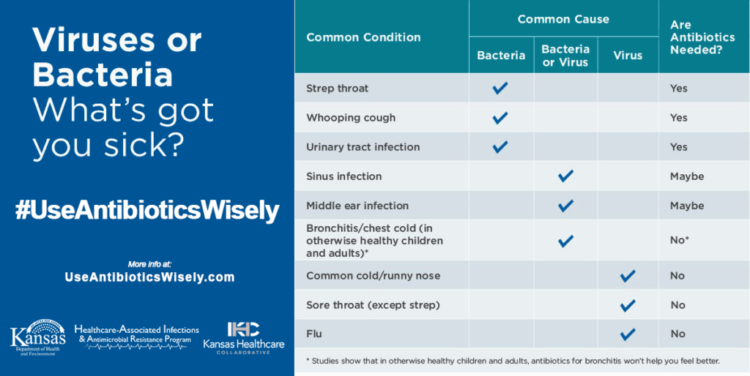State of Kansas Asks Residents to Help Safeguard Antibiotics
Kansas ranked among the highest nationally, total number of antibiotic prescriptions
TOPEKA – Since 2013, the Centers for Disease Control and Prevention (CDC) has recognized a threat to antibiotic resistance and has begun working with many partners across the state and nation to safeguard the effectiveness of antibiotics. In an effort to promote awareness of this important initiative, Governor Jeff Colyer has designated Nov. 12-18 Use Antibiotics Wisely Week.
Kansas Department of Health and Environment (KDHE) Chief Health Officer, Dr. Greg Lakin, says health professionals, patients and their loved ones need to be informed and only prescribe or use antibiotics when appropriate.
“The general public, health care providers, health care facility administrators, veterinarians, food producers and policy makers can all play a part in ensuring that antibiotics are only used when truly needed and likely to be effective,” Dr. Lakin said.
In Kansas, a broad range of individuals, professionals and organizations are working together to adopt best practices to help stem the inappropriate use of antibiotics. A statewide advisory group is assisting KDHE in spearheading this effort.
According to data from the CDC, the total number of antibiotic prescriptions written in Kansas ranked among the highest nationally. In 2015, more than 900 antibiotic prescriptions were written per 1,000 individuals statewide.
Antibiotic awareness does not mean stopping the use of antibiotics; it means changing the way antibiotics are prescribed and used today—when necessary and appropriate.
Since the 1940s, antibiotics have been used to treat patients who have bacterial infections, greatly reducing the number of related illnesses and deaths. But now, more than 75 years later, antibiotics have been overused and misused to the point that the infectious organisms the antibiotics are designed to kill have adapted to them, making the drugs less effective, according to the CDC.
The CDC finds that more than one-third of all antibiotics prescribed or otherwise used in the United States are either unnecessary or the antibiotic does not match the germ. Antibiotics are not needed for viruses, such as colds, most sore throats and many sinus infections.
Especially during the cold and flu season when viruses are prevalent, the public can do its part by recognizing that antibiotics are likely not the right medicine. Antibiotics can fight infections and save lives when used to fight the right germ, at the right time and for the right duration.
More than two million people in the United States get infections that are resistant to antibiotics, and each year, at least 23,000 people die as a result. If drug-resistant germs keep growing, and if we lose the effectiveness of antibiotics, we may also lose our ability to treat patients who need them.
Here are ways you can help:
- Do not request that your doctor prescribe antibiotics.
- Antibiotics may have side effects. When your doctor says that you do not need an antibiotic, taking one may do more harm than good.
- Only take antibiotics that are prescribed for you and take the whole course as directed. Do not share or use leftover antibiotics. Antibiotics treat specific types of infections. Taking the wrong medicine may delay correct treatment and allow bacteria to multiply.
To learn more about antibiotic resistance, visit http://UseAntibioticsWisely.com.
